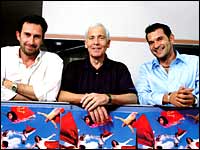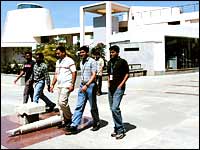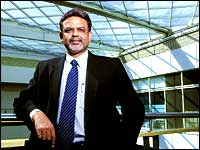 |
|
Expat massage: Ananda
Spa even brings in expat masseurs from time to time
|
 |
| Time to smile:
Spicejet CEO Mark Winders (centre) flanked by two senior
executives |
Quick,
what's common to the director of the country's most-celebrated
Spa, Ananda in the Himalayas, the chief executive of just-launched
budget airline SpiceJet and a consultant at Tata's new retail
venture? Nothing apparently, but for the fact that all three positions
are manned by expatriates.
What's new, you may say, for as long as one
can remember chefs at most big hotels and chief executives at
Indian subsidiaries of a lot of multinational companies were and
continue to be expats? Well, in a way you could call it the second
expat coming. As India Inc. goes global, enters new lines of businesses,
or faces competition from global biggies right at its doorstep,
it is scrambling for talent not available domestically. And that's
making Indian companies, across industries as varied as hospitality,
retail, telecom, mining, aviation and infrastructure turn to expats
for not just senior but even middle-level management positions.
Take low-cost airlines. Both Kingfisher Air
and SpiceJet had to get their head honchos from overseas, simply
because there was no one in India who had experience managing
a low-cost carrier. SpiceJet's CEO, Mark Winders, had developed
the Canadian low-cost airline Canjet. And Kingfisher's President
and coo, Alex Wilcox, is a low-cost airline veteran and was part
of the senior team that launched the US low-cost carrier, JetBlue,
almost five years ago.
Nor is Winders an exception in his firm, for
SpiceJet's head office in Gurgaon is peopled with over half-a-dozen
expats at senior and mid management positions. This includes CFO
Gary Osborne, Executive VP (Engineering) Roger Page, Cabin In-charge
David Platas and Chief Engineer Sargey Filatov.
"Expats are the flavour of the day,"
says R. Suresh, Country Manager of executive search company Stanton
Chase India. Over the last one year, Stanton Chase has head-hunted
around 10 expats to lead big Indian companies.
Global Ambition, Global Talent
Expats are being brought in to fill the crucial
experience gap between Indian and global managers. The Aditya
Birla Group, for instance, brought in Kim Freeman, a Canadian
expatriate, as its coo for overlooking mining operations of Hindalco
in April this year. Freeman comes with 30 years of experience
from Falkonbridge, a Canada-based non-ferrous mining group. The
group also brought in Barry Marshall, a global metal industry
veteran from Hunter Douglas group of companies, as head of risk
management and business development.
| Demand for expat managers is only expected
to rise as more closed sectors open up to private players |
Helping the Tata Group in its global play
is Alan Rosling, Executive Director, Tata Sons and member of the
Group Corporate Centre. Rosling has served as special advisor
to former British Prime Minister John Major in his policy unit,
has been the strategy development director at United Distillers,
and chief executive of Piersons, a division of Courtaulds Textiles.
At another Tata company, Tata Teleservices, Greg Young was brought
on board from Telstra Corporation as Head, Network and Value Added
Services in December 2004.
In the services sector, where the demand
for expat mangers is greatest, it is not just the hospitality
industry that is hiring expats with a vengeance, but even firms
in the organised retail and telecom businesses. "There are
(still) a few skills in the retail industry where there is a deficiency
of Indian talent," says Arvind Singhal, Chairman, KSA Technopak
India. Buying, supply-chain management and visual merchandising
are a few skill sets in organised retail where Indian talent is
either scarce or inadequate. So, in these areas, many retail companies
are sourcing functional heads, essentially mid-level management
positions, from outside the country. Star India Bazaar, a hypermarket
run by Trent (Tata's retail company) has an expat consultant from
French retail major, Carrefour.
Value For Money
The best part is that today, hiring an expat
is no longer an expensive proposition. "Salaries of Indian
executives have (also) gone up significantly," feels Stanton
Chase's Suresh. And sometimes, it makes more sense to hire an
expat, who would cost just a shade more than an Indian manager,
for the international perspective that he/she brings to the job.
And it seems to be working both ways, what with expat managers
finding shifting base to India not just less problematic now,
but even more rewarding given the experience of working in a fast-growing
emerging market like India.
Even while industries like spas and organised
retail work furiously to get the skill sets transferred fast to
India, it looks like this is just the beginning. Demand for expat
managers is only expected to rise, as hitherto closed sectors
open up for private businesses. "Private players who are
getting into managing airports would require expatriates in a
big way," says Nirupama V.G., Associate Director, Team Lease
Services, a placement firm. A client of Team Lease is worried
about managing an airport and maintaining international standards.
In India, there is no expertise available in running a world-class
airport. So much so, that this unnamed client of Team Lease is
also open to sourcing blue-collar workers, such as security personnel,
from overseas to reach higher standards of operations. Now that
would truly be reverse-outsourcing!
SPOTLIGHT
Broadcast Consultants
 |
|
Media Extensions' Rao: TV channel
specialist
|
Bored
with your job in television production, sales or content? Fancy
breaking out on your own as an entrepreneur? Consider becoming
a broadcast consultant. With over 100 television channels slated
for launch, someone out there surely needs to hand-hold them through
the regulatory fine print, hiring of satellites, contracting of
bandwidth, teleports, sourcing production and post production
equipment, and hiring people to put channels on air. "DTH alone
is opening the possibility of over 1,000 specialised channels,"
says U.S. Rao of Radius Media Extensions, a New Delhi-based broadcast
consultant. Though the work is tough, the 0.5-1 per cent takings
of the total project cost more than makes up for often tough and
critical deadlines typical of the sector..
-Shailesh Dobhal
COUNSELLING
Help, Tarun!
 I am a 29-year-old science graduate working for the last 18 months
as a deputy manager in a public sector bank. I wish to further
my career by pursuing a course in MS (Finance) and, eventually
get a Chartered Financial Analyst (CFA) degree from ICFAI, Hyderabad.
Please advise whether these options would help me secure my career,
or some other qualifications are essential. Also, should I change
my job?
I am a 29-year-old science graduate working for the last 18 months
as a deputy manager in a public sector bank. I wish to further
my career by pursuing a course in MS (Finance) and, eventually
get a Chartered Financial Analyst (CFA) degree from ICFAI, Hyderabad.
Please advise whether these options would help me secure my career,
or some other qualifications are essential. Also, should I change
my job?
As far as changing your job goes, with your background and work
experience, you should not have a problem in getting a job in
any of the good private sector or multinational banks. A CFA degree
or a degree in finance will definitely boost your job prospects
in the banking and financial sectors. You could also opt for an
MBA programme, specially from one of the top-rung b-schools. An
MBA degree is in great demand nowadays and you could sit for cat
this year. You could also check out the ICFAI's combined MBA/CFA
programme.
I am a third-year BCom student, awaiting
my final results. I want to start my own business and have several
good business ideas. I am confident that, if implemented, my business
ideas will be a success. However, coming from a middle-class family,
I do not have the financial resources to start on my own. Should
I abandon my dreams and take up a job?
Always dare to dream but don't become "only
a dreamer". If your ideas are good, finances will not be hard
to get. Venture capitalists will not only back you with finances
but will also help you in setting up the infrastructure. Your
ideas should, however, not only be good but also practical and
commercial. You need to have a revenue model or a method by which
your idea, when put into action, can produce profits. You will
therefore need to do some homework-first shortlist one or two
good ideas. Then prepare a proposal on what resources be will
required and how the product/service will be marketed. Then approach
a venture capital firm and discuss the project with them. I would
also advise you to take up a job after your degree. Any project
takes time to implement and there is many a slip between the cup
and the lip. By taking up a job, you will gain experience and
also get an insight into how a company is run.
I am a 31-year-old electrical engineer,
working as a lecturer in a private engineering college for over
five years. The salary is low and the avenues for professional
growth are few even if I go for further studies. Keeping this
in view, I have decided to switch careers and move to the insurance
field. I have registered with the Actuarial Society of India and
am preparing for my exams. Although it will take about two years
to make the switch, please advise me what else I can do to gain
knowledge in this field.
Since you are already preparing for exams,
I would advise you to apply for a job in the insurance sector.
Since you have no prior experience, you will get taken in at a
junior position. It will, however, help you gain a practical understanding
of the industry. You could also assist an insurance agent and
work with him/her on a part-time basis. This will work to your
advantage as you will not have to leave your present job while
you are preparing for the exams.
I am an engineering graduate (mechanical)
and wish to pursue an MBA programme, preferably from one of the
IIMs. What should my future course of action be? Should I appear
for CAT this year? If you suggest that I get some experience first,
what kind of job should I take up? Because of family constraints,
I could not take up a job after completing my B.Tech in April
2004. Could that work against me?
If you are keen on doing an MBA, I would
recommend that you appear for cat this year. There is no need
to wait for a few years since you are not doing anything at the
moment. In case you are not able to get admission this year, then
I would suggest you take up a job and apply again next year. As
to your question of whether your doing nothing since April 2004
will have a negative impact, I would say that it could to a minor
extent, unless you have a very good explanation for it. In any
case, it will not play a big role in the admission process. Whether
you take up a job or do post-graduation, both will help you in
the long run. While a job will give you experience, further studies
will bring you up-to-date in your field of study, especially since
you have not been doing anything for year now.
Answers to your career concerns are contributed
by Tarun Sheth (Senior Consultant) and Shilpa Sheth (Managing
Partner, US practice) of HR firm, Shilputsi Consultants. Write to
Help,Tarun! c/o Business Today, Videocon Tower, Fifth Floor, E-1,
Jhandewalan Extn., New Delhi-110055..
Eyes
Wide Open
Stock options are
back, but should you be lulled?
 |
| We're back: Stock options
have made a tentative return |
The
days of it companies doling out generous employee stock options
to all comers are clearly over. But stock options are nonetheless
making something of a comeback due to the resurgence in the stock
market. So, companies such as Infosys and Wipro are giving a select
group of employees restricted stock units at nominal rates. Others
like Mphasis have offered stock options to meritorious employees
and still others are experimenting with stock appreciation rights,
where the employee gets the incentive of stock appreciation and
not the stock itself. The moot question is: Should you be lulled
into it either as a retention tool or an incentive to join a new
company?
"Stock can't be used to bridge a salary
gap and need not be just for white-hot privately-held companies
to make up for deficient salaries," says Ravi Ramu, Chief
Financial Officer, Mphasis. While stock options may be a tempting
bait to join a product or start-up technology company, especially
at the pre-IPO stage, remember well that the humongous value jumps
witnessed by it stocks in the past is, well, a thing of the past.
-Rahul Sachitanand
A
Few Good Men
HR for good money
and quick career growth? Sure.
 |
| Heidrick & Struggles' Das
Mahapatra: Hunting for HR heads |
Often
thought of as unglamorous, human resource (HR) professionals,
it seems, never had it so good. There is a dearth of hr professionals
across corporate India, and the good ones are being headhunted
with a vengeance. Job site Naukri.com has reported an over 40
per cent jump in hr job listings in the past 12 months. And executive
search firm Heidrick & Struggles International estimates that
at least 200 searches for hr heads from the country's top 50 employers
is currently underway.
Little wonder, salaries for hr professionals
have gone through the roof. "Today, hr heads for even mid-sized
companies are being offered Rs 30-40 lakh a year compared to half
that amount a couple of years ago," says Arun Shankar Das
Mahapatra, Managing Partner (India), Heidrick & Struggles
International. Even then finding the right talent is difficult.
"That's why young guys don't have to wait for ages to become
hr heads now," says Mohit Mohan of Gilbert Tweed. What's
best is that hr's role is evolving from being a mere staffing
function to being a strategic business partner, much like marketing
or finance. Any takers?
-Kumarkaushalam
|







 I am a 29-year-old science graduate working for the last 18 months
as a deputy manager in a public sector bank. I wish to further
my career by pursuing a course in MS (Finance) and, eventually
get a Chartered Financial Analyst (CFA) degree from ICFAI, Hyderabad.
Please advise whether these options would help me secure my career,
or some other qualifications are essential. Also, should I change
my job?
I am a 29-year-old science graduate working for the last 18 months
as a deputy manager in a public sector bank. I wish to further
my career by pursuing a course in MS (Finance) and, eventually
get a Chartered Financial Analyst (CFA) degree from ICFAI, Hyderabad.
Please advise whether these options would help me secure my career,
or some other qualifications are essential. Also, should I change
my job? 
